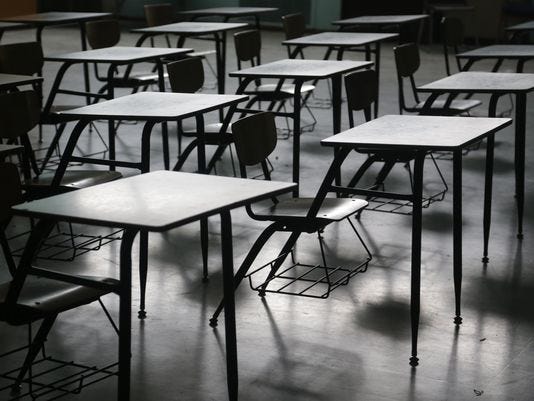
Alabama private schools and their students face academic uncertainty as a shortfall in scholarship money provided through a state program, as well as a potential drop in enrollment attributed to the coronavirus pandemic.
The Alabama Accountability Act, which is funded by taxpayers who choose to donate toward funding scholarships in exchange for a credit toward their state tax liability failed to reach its $30 million cap in 2019.
That cap, which was reached the past two years goes toward the scholarships of about 4,000 Alabama students who opt of out the public education sector to attend private schools. Scholarships are awarded to students who are zoned for 'failing' schools or who are considered economically disadvantaged, the latter being the larger portion of recipients.
About half, $14.9 million, in credits were reserved in 2019 — the lowest amount since 2014. The shortfall could end up being even greater, as extensions for tax filings — where the reserved credits are actually claimed — continue to be extended due to the pandemic.
The drop in reserved credits, which had an end-of-the-year deadline, are not a result of the pandemic, said Warren Callaway, executive director of Scholarship for Kids' — one of the act's scholarship granting organizations. He pointed to a loophole that made donating to the act more lucrative than the actual donation was closed and the state's standardized deduction was increased.
With less funding, some students will lose their scholarships and families — the majority of which are considered low income — will be forced to move to a different school or pay for tuition, or private schools will have to cover the cost.
In Montgomery, private schools received about $2.2 million through the act in fall 2019 — through funds collected in 2018.
Of those schools, Success Unlimited enrolled the largest number of AAA students, with 181 students that brought in $523,742.
The financial impact on her school isn't as troubling as how it is impacting students, Success' Headmaster Susan Alred said.
"We are just more concerned with how the children are going to adjust having to leave a program that has been a blessing," Alred said. The shortfall is, "taking these children from where they were successful and they lost a program that was supporting them and their family. The lost their structure being out of school in March and now they are having to adjust to another program."
About 30 Success students lost their entire scholarships, while another portion lost half of the funding. Of that latter group, about 60% of their families were able to cover the second half of the tuition, while others left the school.
Alred said the school's financial stability is still in tact, but that there has been a decrease in enrollment this upcoming semester, due to the pandemic.
"Parents are just uncertain," she said.
In a national survey of private schools done by EdChoice, about 65% of schools said they were “extremely” or “very” worried about their families struggling financially and 51% said they were “extremely” or “very” worried about losing enrollment next year.
There are 165 schools that qualify to receive funds from the act — some of which have student populations that are largely supported by the act.
After Success, Montgomery's Valiant Cross Academy enrolled the second largest number of AAA students, with 107 of its 150 students receiving scholarships through the act, which totaled $443,309.
Rather than turn students away, Valiant was able to rely on its fundraising efforts to keep students enrolled who lost their scholarships. The private school, which generally enrolls 30 new sixth-graders each year, did have to cut that incoming class in half, though.
Kimberly Baker, the school's director of development, tried to focus on the positive side of this fact, pointing to the benefits of a smaller class amid the coronavirus pandemic. The shortfall in scholarship dollars, though, "is an unfortunate situation," she said.
"The AAA really benefits the scholars at Valiant Cross but it also benefits many, many students across the state of Alabama and I feel it's our responsibility to look at all options to help fund these type of schools so these parents have options and have school choice," Baker said.
An exact number of how many students statewide lost their scholarships is unknown, as the most recent quarterly reports by scholarship granting organizations have yet to be posted.
Callaway said he and three other scholarship granting organizations have appealed to Gov. Kay Ivey to use CARES Act funds for education to cover a portion of the act's shortfall in, but they have not received a response.
Last week, Ivey's office announced a $170 million allocation to Alabama public schools.
Contact Montgomery Advertiser reporter Krista Johnson at kjohnson3@gannett.com.
"lose" - Google News
July 28, 2020 at 06:00PM
https://ift.tt/3hBSWG6
Alabama Accountability Act shortfall causes students to lose fall scholarships, strains private schools - Montgomery Advertiser
"lose" - Google News
https://ift.tt/3fa3ADu https://ift.tt/2VWImBB
Bagikan Berita Ini














0 Response to "Alabama Accountability Act shortfall causes students to lose fall scholarships, strains private schools - Montgomery Advertiser"
Post a Comment